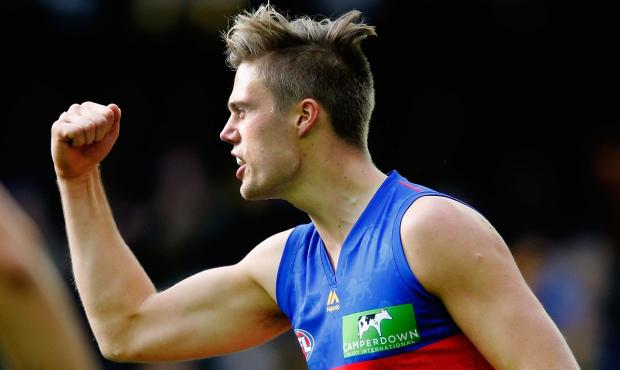- Lyon caution despite eagerness for Bennell return
- Ballas ready to pop: Lyon
- NGA uncovering the next big thing
Callum Twomey from AFL.com.au runs through the recruiting teams of each AFL club.
Recruiting departments are tasked with perhaps the most difficult job at every AFL club: shaping their team's direction in the short, medium and long term. They are all at different stages of their road towards a premiership, but the job insists they must take a broader look all of the time.
There's the trade targets. The retention of their own players. The scouting of this year's draft, next year's draft and the one after that. Then there's the strategy, the planning, the meetings, the decisions and the minutiae that lies behind the scenes.
So how does your club do it? AFL.com.au looked at each club's recruiting and list management department, uncovering who does what, who makes the tough calls and how each is a little bit different to the next.

Fremantle boast one of the bigger recruiting teams in the competition. General mamager of list management Brad Lloyd is the boss, overseeing the scouting of AFL players, contracts and the draft, and has the final call on decisions. But responsibility also lies with recruiting manager David Walls, the son of former Carlton coach Robert, and Neil Ross, who is Fremantle's top pro scout. Trent Mosbey, David McMullin and Ed McMullin make up Fremantle's contingent of under-18 watchers. The club formerly assigned areas of the country to certain recruiters to track, but takes a more nimble approach now, pushing resources to where the pool looks strongest. Steve Gloury is a part of Fremantle's recruiting line-up as a recruiting analyst, Peter Gibbs works as a profiling expert, and former Hawthorn head recruiter John Turnbull, who famously chose Luke Hodge in the 2001 'superdraft', is a part-time consultant. Turnbull can offer a point of difference with his long recruiting background.

Former leading player agent Justin Reid joined Adelaide as the club's list manager at the end of 2014. The introduction of the soft cap on football department spending has impacted every club's ability to innovate in the area of recruiting, but Reid is one of five full-time members of the Crows' department. Former Tasmanian under-18 coach Hamish Ogilvie, who formerly worked in the police force, took on the recruiting manager role in 2012. In Ogilvie's first draft the Crows were stripped of picks due to the Kurt Tippett saga, but the club nabbed a steal in Rory Atkins at No.81. Phil Bunn (eastern) and Scott Degabriele (western) are the Crows' other full-time recruiters, alongside pro scout Stephen McCrystal who also watches state league football. Adelaide has a dozen part-time recruiting staff, and also uses other resources within the club – its coaches, welfare, high performance staff – to get a wider view of the available prospects every year.

The Lions lost list manager Peter Schwab at the end of last year and replaced him with long-time Gold Coast recruiting manager Dom Ambrogio, who had previously worked at the Western Bulldogs. Ambrogio's first major tick since taking control of the list was the re-signing of key forward Josh Schache, who had been weighing his future. Stephen Conole leads the recruiting department overseeing the under-18 system, with last year's draft crop already looking a winner for the club, and he's assisted closely by Andrew Farrell, former Fitzroy great Leon Harrisand eight weekend scouts around the country. Ex-Carlton recruiter Shane Rogers covers off mature-age players at state level in all competitions and some AFL matches, but the pro scouting is largely left to Dave Dunbar, who has worked in the past as an opposition scout. The Lions' team is rounded off by Ash Drake, who plays an important role in watching games in the northern states and being a key conduit between its academy program and recruiting office.
The retention of Josh Schache was a big win for the Lions. Picture: AFL Photos

Having set up Greater Western Sydney's inaugural list, Carlton champion Stephen Silvagni left the Giants at the end of 2014 to return to the Blues as their list manager. At the start of this year he was reunited with former Giants recruiter Paul Brodie, who joined the Blues as their national recruiting manager after serving a 12-month ban for betting on AFL matches in his time at GWS. The Giants have clearly had an impact on the Blues' recruiting strategy, with eight players on Carlton's list having previously been at GWS. Dale Harris and Michael Jordan make up the club's recruiting division, with Sam Power working as its pro scout. Power, who played 123 games with the Western Bulldogs and North Melbourne, fulfils that role alongside his responsibilities as the Blues' football operations and integrity officer.

The Magpies, perhaps surprisingly given their status as the competition's biggest club, are on the smaller side in the recruiting area. Derek Hine is the boss: he makes the final call in the recruiting and trade/free agency decisions as its list manager. He joined the club in 2003 but officially became its list and recruiting manager several years ago as lieutenants Dom Milesi and Matthew Rendell stepped up their roles. Rendell joined the Pies after his stint as Crows recruiting manager, including the brave call to select Patrick Dangerfield at No.10 in 2007. Rendell's role at the Pies includes identifying the talent, with Milesi adept at using the statistics to provide extra analysis. Adam Shepard is a national recruiting officer, and the Pies have part-time managers in all states, and about 15 scouts who report to them from around the country. The Pies call on some consultants in terms of the organisation of data, but are relatively thin in the core team.

Adrian Dodoro has been at Essendon so long it's almost hard to remember the club without him. The club's list and recruiting manager was there for the Kevin Sheedy days, and has also overseen the playing group for the four coaches who have been at the helm since Sheedy departed at the end of 2007. It's a small team at Essendon, though, with Dodoro one of four full-time recruiters. Richmond premiership player Merv Keane has notched 10 years as the Bombers' senior recruiter, while former Essendon and Fremantle player Rob Forster-Knight is another recruiting officer, using his sports science background to focus on the analytics side. Bryce Lewis departed North Melbourne as its recruiting manager after last year's draft and is now the Bombers' pro scout. The Bombers added Georgia Harvey to their department 12 months ago to sort through the administrative side of contracts. Outside of Victoria, the club has one part-timer in all other states, while former recruiting manager Noel Judkins is based in Cairns but is used as a 'video specialist', poring over game tapes and vision to provide his thoughts.
Adrian Dodoro has been running Essendon's recruiting since Kevin Sheedy's days. Picture: AFL Photos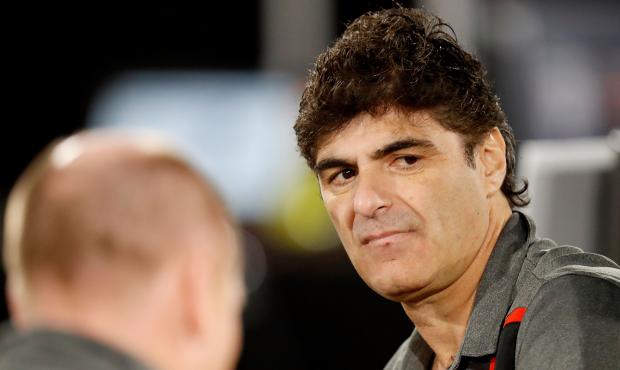

There are three full-time members of the Cats' scouting team, including veteran list and recruiting manager Stephen Wells, former Brisbane Lions midfielder Troy Selwood and Liam Woodland. Selwood and Woodland are both in their first years of the role full-time, while Wells has been at the helm of the Cats since 1994. In that time he has become renowned for finding gems, including Corey Enright, Shane Mumford, Mark Blicavs and Matthew Egan. Selwood holds the role of talent ID manager, which sees him spot the players for his team to follow through the year, as well as organise where to send staff each weekend. Woodland is a talent ID assistant, with the club having one part-timer and six weekend 'watchers' across the country: one in Adelaide, one in Perth and four in Victoria.
Veteran recruiter Stephen Wells has plenty of runs on the board. Picture: AFL Photos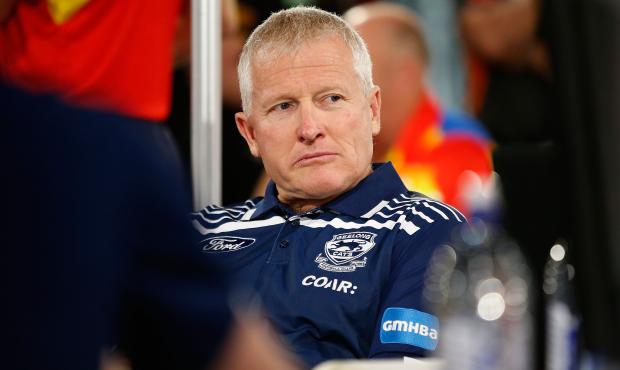

The Suns landed experienced recruiter Scott Clayton as their inaugural list manager, poaching him from the Western Bulldogs. Clayton had previously led the Brisbane Lions' recruiting team, and is by far the most experienced member of the Suns' team, which has three full-time staff after losing Dom Ambrogio to cross-town rivals Brisbane Lions and long-time recruiter James Murch to player management. The Suns didn't replace Ambrogio but did bring in Mark Micallef from Essendon to join Kall Burns as a recruiting officer. The pair share responsibilities throughout the year, breaking up who organises the interviewing process, their set-up at the combine as well as splitting contacts at local clubs across the country to not overlap. The club uses three part-time scouts, including one in both Perth and Adelaide, and calls upon the Suns' opposition scout, Brett Munro, to cover its pro scouting brief.

At the start of last year the Giants' recruiting department consisted of two people – Adrian Caruso and Phil Scully– after the club had lost list manager Stephen Silvagni and recruiter Paul Brodie in successive years. But the Giants recognised they needed to beef up in the area, aware the pool of top-end academy players coming through their zone, which had made up many of their draft selections, was drying up. They're now up to five full-time staff, with Caruso, who started at the Giants as an opposition scout, heading the recruiting and Craig Cameron, formerly of Melbourne and Richmond, is in the list manager's seat. Cameron deals with contracts and attaining players, but keeps an eye on the pool given the Giants have regularly had early draft picks. Scully, the father of Giants midfielder Tom, tends to focus on Victorian talent and John Giramondo casts his eye more over prospects in South Australia and Western Australia. Former journalist Emma Quayle also joined the team this year, with the club keen for her to experience all facets in her foray into recruiting. The Giants have two part-time staff, and use academy coach Jason Saddington to feed them information on players in New South Wales.

The Hawks have stuck to the same recruiting structure since 2010, and why not? It has brought brilliant success in that period. That was when Graham Wright took the joint recruiting and list manager role, having previously been in charge of recruiting. The 1990 Collingwood premiership player works closely with Mark McKenzie and Geoff Morris, the Hawks' two main recruiters. Morris is based in Adelaide and is assigned the western states talent pool, with Melbourne-based McKenzie covering the eastern side. Dale Bleach mixes his time between pro scouting and the junior scene, plus some coverage of the academies, while Mitch Cashion is in constant contact with the Hawks' Next Generation Academy coach Nathan Foley to specilaise in that area. Cashion also assists Wright with the compliance and administration element of the contract business. The Hawks have about a dozen part-time staff around Australia, and get them together mid-year for a conference to share their thoughts on their talent areas.
Graham Wright has had brilliant success in the recruiting and list manager role. Picture: AFL Photos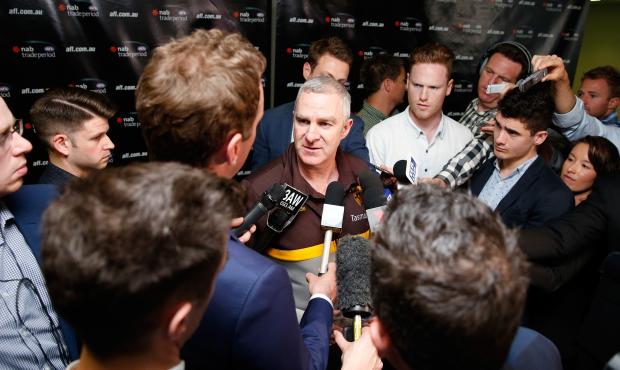

The Dees have had a stable recruiting division since Jason Taylor took the reins in 2013. Taylor, who came from Collingwood, makes the calls at the national and rookie drafts and also oversees the talent identification process in Melbourne's Next Generation Academy. Aside from his early picks, including Clayton Oliver at No.4, Taylor's best hit seems Jayden Hunt, who he plucked out of school footy in 2013 when some clubs didn't know of the speedy teenager. Tim Lamb and Darren Farrugia are Melbourne's recruiting officers, with all full-time staff expected to have a grasp of the talent across the country. Todd Patterson is at the club in a part-time role overseeing the future draft talent, the Dees' womens' team list management and the NGA too. Club great and former skipper Todd Viney, the father of current co-captain Jack, is the manager of player personnel and oversees list management and the plans of the club. As the Demons' pro scout, Kelly O'Donnell's work sits alongside Viney's. O'Donnell has a primary focus on listed AFL players who may be available, as well as watching state leagues. The Dees have people on the ground in states outside Victoria to keep their network strong.

There are two new faces in charge of North's division this year, with long-time Geelong recruiter Michael McMahontaking on the list manager's position and Mark Finnigan elevated to recruiting manager. North have elected to have additional full-time staff ahead of expanding their network of part-timers (they have eight in part-time positions around the country, including a manager in Western Australia). Each of the club's recruiters look after particular areas. Ben Birthisel follows the South Australian and Northern Territory talent, Rhys Harwood keeps across the players coming through in Queensland, New South Wales and Tasmania, and Finnigan oversees the Victorian region. Mark Barnard is dedicated to watching talent for future picks, and Nick Byrne is the club's scout of AFL-listed players. Former Dees scouting boss Barry Prendergast is in a talent ID role for the club's Next Generation Academy, which could produce a talented pick next year in Tarryn Thomas. Former list manager Cameron Joyce, who has moved into the football manager's seat at Arden Street, remains on the club's list management committee.
Former North list manager Cameron Joyce at the 2016 US Draft Combine. Picture: AFL Photos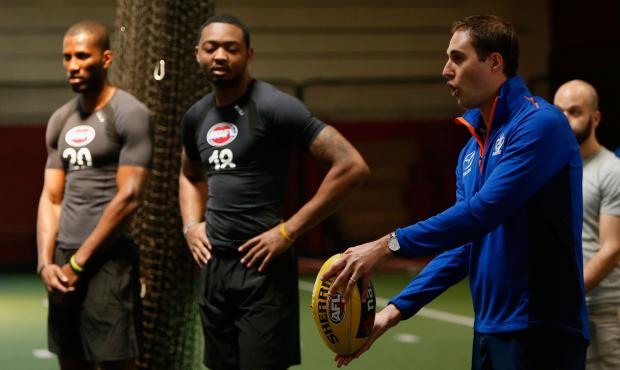

Jason Cripps has been Port's list manager since the end of 2011, having moved into that role after four seasons as Mark Williams' assistant coach. Cripps is based at Port's office in Melbourne, while the Power's recruiting manager Geoff Parker works out of the club's Alberton Oval offices. Anthony Parkin and Chris Drain are also key members of Port's set-up, with Parkin having a focus on Victorian and Tasmanian talent, and Drain specialising in pro scouting and future drafts. About once a month Drain will update the rest of the Port scouts about the prospects in drafts beyond this year, with the full group heading to the under-16s carnival last week in Queensland to have a better gauge. Anton Grbac, who steered the Vic Metro talent program until last year, is one of the club's two part-time staff, while they also have two weekend scouts in Perth, in Adelaide and one in Sydney to watch the NEAFL. Football manager Chris Davies gives strong autonomy to the department for its targeting of players and in its recruiting decisions.

Richmond's recruiting set up underwent change at the end of last year when Neil Balme came to the club as football manager. It meant Dan Richardson moved more into a general manager role focused on talent, and he handles Tigers contracts and total player payments. He's also responsible for the Tigers' Next Generation Academy program, into which the club has invested plenty of time and sees as a big part of its recruiting future. Blair Hartleyis in charge of the list and its direction, while Matthew Clarke, in his first year as the club's recruiting manager, will have two first-round picks at this year's draft. Everyone in the Tigers' group has an eye over the national pool, but recruiting officers Luke Williams (Victoria), Richard Taylor (division two states and academies) and Francis Jackson (future drafts) watch over specific areas as well. Opposition analyst and pro scout Nick Austin rounds out the Tigers' team, with the club having 10 extra scouts in part-time positions.
Dan Richardson has a key role in the Tigers' recruiting and development. Picture: AFL Photos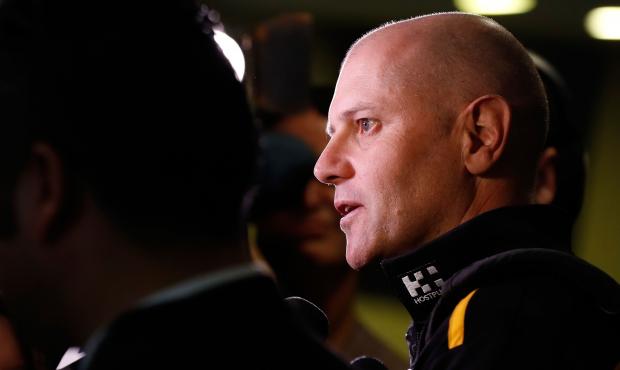

Former Saints assistant coach Tony Elshaug combined his recruiting manager role with the list management side of things at the start of 2015, when previous Saints list manager Ameet Bains moved into a chief operating officer role at the club. Bains still has an involvement in his former department: specifically with player contracts and managing the club's salary cap. Elshaug, who was also a long-time assistant to Denis Pagan at North Melbourne and Carlton and before that a premiership player with Essendon, has had to watch more AFL games in his updated role, meaning more responsibility has been shared with his recruiting team. The club's three full-time under-18 scouts are based at Seaford but oversee different areas of the country, with Chris Liberatore handed Victoria, Mark Smart on top of Western Australia and South Australia, and Chris Toce responsible for all division two states (Queensland, NSW-ACT, Tasmania and the Northern Territory). Ex-Blues recruiting boss Wayne Hughes is the Saints' pro scout and part of its list management committee. The club has 17 part-timers scattered throughout the land, including former chief recruiter John Beveridge, who focuses on finding alternative athletes from other sports.

One of the most experienced recruiters in the industry, Kinnear Beatson, heads the Swans' small department. Beatson was a lead recruiter for the Brisbane Lions between 1994-2005, building their dynasty, before joining the Swans at the end of 2006 and shaping their 2012 premiership list. Beatson is the Swans' recruiting and list strategy manager, overseeing who comes into the club and liaising with player managers through the year to be on top of the market. The club's football manager, Tom Harley, takes care of the contract negotiations. Michael Agresta and Ross Monaghan are the Swans' other full-time staff, with Agresta focusing on the national draft. He is also the Swans' recruiting operations manager, being responsible for planning, data entry, vision and logistics. Monaghan is completely dedicated to the 'futures', keeping an eye on the prospects coming through in upcoming drafts. They also have part-timers in SA, WA and Queensland. Beatson does some AFL scouting, but the Swans tend to cover their pro scouting through their match committee.
Kinnear Beatson (left) is one of the veterans of the AFL recruiting scene. Picture: AFL Photos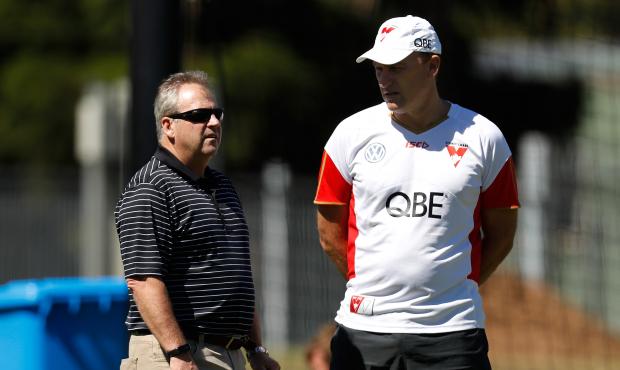

West Coast pours plenty of resources into its recruiting department, making it one of the competition's biggest teams. Rohan O'Brien is into his seventh year as the club's recruiting manager, overseeing five full-time staff spread around the states to monitor the talent coming through. Former Eagles player Brad Smith and Trevor Woodhouse take a more national view, while Jordan Loxley and Steve Nash (in Victoria) and Duane Massey (in South Australia) are more specialised in their areas. Because of their deeper list of full-timers, the Eagles have six part-timers, a smaller group. Former Kangaroos midfielder Brady Rawlings is into his first year as the club's list manager, having previously been an assistant coach to Adam Simpson, with Adrian Battiston the Eagles' pro scout. Rawlings arrived at West Coast at the end of 2013 having been a recruiter with the Roos. Football manager Craig Vozzo also keeps a close eye on under-18 action at different stages of the year to be on top of the talent pool.

More finances for the Dogs' recruiting department in the past few years changed their philosophy to make each scout a specialist in certain areas. Having been short-staffed before then, the club found gaps were exposed in its coverage of players at AFL and junior level. But that has been tightened now, with Jason McCartney the decision maker in the list management area (trades and free agency), and Dan Fisher working as the Bulldogs' pro scout. Simon Dalrymple, whose selection of Marcus Bontempelli at No.4 in the 2013 draft shaped their run to last year's premiership, is the recruiting manager, with a team of four full-timers beneath him. Jamie Downs (South Australia, Western Australia and Northern Territory) and Wayne McCraw (Victoria, NSW and Queensland) are the Dogs' leading recruiting officers for their respective zones, while Dave Weston is the organiser of the recruiting team. He collects all the GPS numbers and Champion Data statistics, maintains prospects' fitness and psychological profiling and plans for key events through the year. In a newer role, David Newton manages the Bulldogs' Next Generation Academy, seeing him identify possible prospects in the club's specified areas. They have 10 part-time staff.

